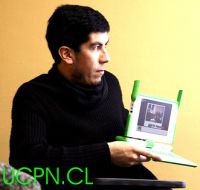Have you counted how many "cheap computers", "low-price laptops" and similar devices have we heard about in the last 12-15 months? Probably around a dozen.
And I'm sure there are many more coming, including aggressive sales strategies. Somehow this is not unexpected and probably not entirely dangerous for the One Laptop Per Child project.
Back in December 2006 I wrote a post about what I termed as "The Negroponte Effect". It is based on two by-products of the OLPC initiative:
- OLPC is expanding the idea of the universal access to the ICTs as something possible and near in time.
- OLPC promotes economic competition and the development of new models to support the developing world.
Access to computers is increasingly related with national development, particularly after the UN Millennium Development Goals (MDGs) included ICT as one key element to achieve these goals. Take any developing nation and you'll see how there's an increasing interest in getting technology for their people. Here at OLPCNews we have read about the Bolivarian Computers that Venezuela is planning to build. Algeria has the OUSRATIC plan (1 PC per family) and something similar does Tunisia .
That's why Nicholas Negroponte himself has said that "because the numbers are so large, they [Intel] look at those numbers and they say, 'If we're not in those, we're toast.'" Yet, that is actually truth not only for Intel but also for the whole industry: desktop computers manufacturers, educational software designers (especially those built on Windows), technical support, producers of servers, printers and peripherals, and so forth.
Everybody in this industry is desperately chasing the dream of getting a slice of 'next billion customers'. And our beloved white and green little laptop is in the middle of this battle. So, am I surprised about new competitors? Sure I am not.
Yet, there are literally millions of new users demanding ICT devices every month. But only a fraction of them are potential XO users. I guess the question is not whether those competitors can harm the project but whether the promising OLPC initiative can actually be fully deployed in at least a couple of developing nations. This is something still to be seen.




Intel's 90nm manufacturing plant in China, and Intel's 1 billion dollar investment in India's ICT are some of the bargaining factor that Intel has used to convince Chinese and Indian policy makers not to sign with OLPC thus far.
This is obviously a case of corruption or negociations where Intel has the final say no matter what. To get some distribution deals in China and India of the AMD-powered OLPC XO, Intel will have to approve it. Cause OLPC doesn't have billion dollars 90nm manufacturing plants and billion dollar ICT investments to bargain with. OLPC only has cheap laptops to offer, and that in itself will take a lot of momentum from test elsewhere in the world to convince policy makers that it can outweigh 90nm manufacturing plants and other billion dollars worth of promised investments.
Also,
InfoDev has a good list of low-cost computing efforts (specifically aimed at developing world situations.
That's quite a list. I know that at least one project is on life-support if not, for all intents and purposes, dead: the Simputer.
Judging from the difficulties that XO has had coming to market I wonder what percentage of InfoDev list will ever see the light of day?
Here's a link to the list for anyone who's interested:
http://www.infodev.org/en/Publication.107.html
Hi Allen,
The Simputer is not actually dead: it is being used by traffic cops in Delhi, Bangalore and Kolkata. (I am not making this up.)
We put things on this (admittedly idiosyncratic) list if we think there is something interesting to learn from them (and/or the hype around them); inclusion on or exclusion from the list is not a comment on an individual product's viability (either in the market, or technologically, or politically). We deliberately exclude 'phones' (whatever that means these days), with one exception. Some of these are definitely protoypes (the Fone+ -- the exception I just referenced -- is an obvious example), and some are definitely dead (e.g. HP device and the Village PDA). We deliberately leave off devices that aren't marketed in developing countries, even if they are "low-cost" (like the Nokia 770 mobile internet device I am using to type this blog comment).
fyi We also keep a list of 'news items' (around 400 or so) archived on our site at http://www.infodev.org/devices-news -- unfortunately we don't have these tagged to individual products/companies/countries (not enough hours in the day), but there are articles -- in some cases scores of articles -- about everything on the list (we try to update this weekly but I my travel schedule is picking up and I am a little behind).
I wasn't aware of the Ousratic plan in Algeria (will have to investigate), but there are lots of government supported/promoted PC ownership plans around the world (we list just a few of them at http://www.infodev.org/en/Publication.108.html ).
Cheers,
Mike from infoDev
ps Wayan, my apologies in advance if referencing some of our materials here is an improper use of the commenting function on this blog.
Mike,
You're always welcome to add your comments to OLPC News. You know more about ICT4Dev than many of us. I personally wish that you might make an hour in your day for a post here....
Everybody in this industry is desperately chasing the dream of getting a slice of 'next billion customers'. And our beloved white and green little laptop is in the middle of this battle.